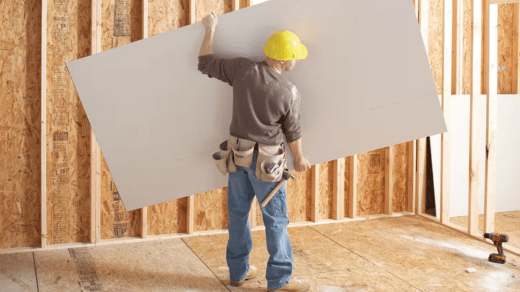Drywall, also known as plasterboard, gypsum board, or wallboard, is an essential material used in nearly every home. It is a panel made of calcium sulfate dihydrate (gypsum) and is commonly used for interior walls and ceilings. Drywall not only provides a smooth and durable surface for painting or wallpapering, but it also plays a crucial role in the overall structural integrity and fire resistance of a building. In this article, we’ll explore what drywall is and why it’s an important component in any modern home.
The History of Drywall
Drywall has been used in construction for over a hundred years, but with advancements in technology and manufacturing processes, it has become the go-to material for interior walls and ceilings. Before drywall, walls were typically finished with lath and plaster, which was more labor-intensive and time-consuming to install. In the early 20th century, drywall began to gain popularity due to its ease of installation and cost-effectiveness.
The Composition of Drywall
As mentioned earlier, drywall is made primarily from gypsum, a natural mineral found in rock form. Gypsum is crushed into a fine powder and then mixed with water to create a paste that is spread over a thick paper backing. The paste sets and dries into a solid panel, which is then cut into standard sizes for use in construction. Some drywall also contains additives like fiberglass for added strength and moisture resistance.
Types of Drywall
There are several different types of drywall available, each with its own unique properties and uses. Standard drywall is usually white in color and comes in various thicknesses, ranging from 1/4 inch to 5/8 inch. Thicker drywall is more durable and better at soundproofing but can be more challenging to install due to its weight. There are also specialized types of drywall, such as moisture-resistant or fire-resistant, that are designed for specific environments.
Importance of Drywall in Construction
Drywall is an essential aspect of modern construction for several reasons. Firstly, it provides a smooth and even surface for finishing walls and ceilings, creating a polished look in any home. Secondly, drywall is relatively easy and quick to install, making the building process more efficient. Additionally, drywall plays a crucial role in the structural integrity of a building, providing support and stability to the overall structure. It also has fire-resistant properties, which can help contain or slow down the spread of fire in case of an emergency.
Advantages of Drywall
Aside from the reasons mentioned above, drywall also offers several advantages that make it a popular choice for interior walls and ceilings. It is more affordable than traditional lath and plaster, making it a cost-effective option for homeowners. Drywall is also easily repairable in case of damages, unlike other wall materials that may require complete replacement. Furthermore, it can be painted or wallpapered to match any design aesthetic, giving homeowners the flexibility to customize their living spaces.
Some of the notable benefits include:
- Speed of Installation – Drywall can be installed quickly, reducing construction time and costs.
- Durability – Drywall is strong and resistant to cracks and dents, making it a long-lasting option for interior walls.
- Moisture Resistance – With the addition of moisture-resistant additives, drywall can withstand high humidity levels commonly found in bathrooms or kitchens.
- Cost-Effectiveness – Compared to other wall materials, drywall is much more affordable and readily available.
- Versatility – Drywall comes in various sizes and thicknesses, making it suitable for different applications and environments.
- Fire Resistance – Drywall has a high resistance to fire and can help slow down the spread of flames in case of an emergency.
- Sound Insulation – Thicker drywall can effectively reduce noise levels, making it an excellent option for soundproofing rooms.
- Repair and Maintenance – Drywall is easy to repair and maintain, making it a practical choice for homeowners.
Why is Drywall Used?
Drywall is used in almost every home because it offers numerous benefits, such as affordability, durability, and fire resistance. It also allows for quick and easy installation, making the building process more efficient. Its versatility and customizable properties make it an excellent choice for homeowners looking to personalize their living spaces.
For more information, please visit A-Pro-Finish Drywall to get all the gist that you need to know on how drywall is installed in your home, what type of drywall you need based on your location and weather conditions in your are and a few other things that need to be considered.
Challenges and Considerations
While drywall offers many advantages, there are some challenges and considerations to keep in mind. Thicker drywall may be more challenging to install due to its weight, so it’s essential to consider the capabilities and limitations of your construction team. Additionally, excessive moisture can cause drywall to deteriorate, so it’s crucial to use moisture-resistant drywall in areas prone to high humidity levels.
In summary, drywall is a fundamental material used in construction due to its versatility, cost-effectiveness, and structural benefits. From its humble beginnings to its various forms and uses today, drywall continues to play a significant role in shaping the modern homes we live in. Whether you’re building a new home or renovating an existing one, drywall is an essential component that should not be overlooked. So next time you admire the smooth walls and ceilings of your home, remember the importance of drywall in making it all possible. Some additional topics related to drywall that could be explored include installation tips and techniques, how to repair damaged drywall, eco-friendly alternatives to traditional drywall materials, and decorative options for adding texture or color to walls with drywall products.

